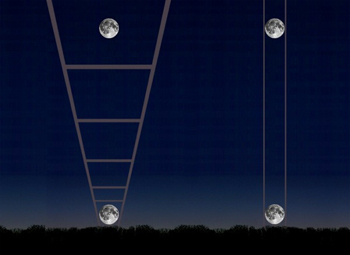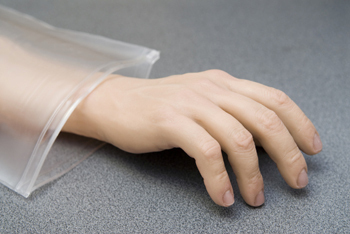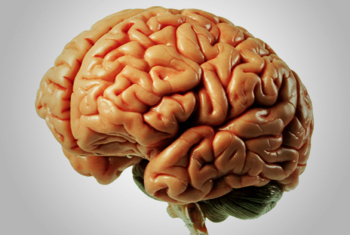5 Mind-Blowing Ways Your Senses Lie to You Every Day

We are so completely dependent on our five senses every moment of the day that we totally forget how full of shit they can be. Your reality is cobbled together from a bunch of different parts of your brain working in conjunction, and often it's like a bickering conference room full of uncooperative co-workers. In fact, we're pretty sure the thing your brain does best is convince you that it works.
But it doesn't take much to spot the bizarre little flaws in your gray matter. For example ...
Your Eyes Can Make You Hear Different Words

When you hear someone talk, the whole process is pretty straightforward, right? The sound comes out of the other person's mouth, it travels into your ears, and voila! -- you just heard what they said. Congratulations. If your hearing works fine, what could possibly go wrong?
Short answer: your eyes. They can butt in and mess everything up. You see, vision is the most dominant sense in humans, and that means that what your eyes are seeing will sometimes override what your ears are hearing. If you want to experience this right now, check out this video:
In the clip, you see (and hear) a guy saying "bah bah bah" over and over. Afterward, he changes his tune to "fah fah fah" ... or so your eyes would have you believe. In reality, the audio never changed, only the picture did. That is, the voice is still saying "bah," but since it's now dubbed over a picture of the same guy pronouncing "fah," your brain actually changes what you're hearing so that it doesn't conflict with what you're seeing. If you close your eyes or look away, "fah" automatically goes back to being "bah."

Your brain also gave the "fah" version a tan, for unknown reasons.
This illusion is called the McGurk effect, and the creepiest part is that, even knowing know full well what's going on, you can't get your ears to hear the correct sound. Scientists who have been studying this shit for decades are still fooled.
The McGurk effect tends to be minimized when you're interacting with familiar faces, but it gets worse if you're dealing with strangers. Things like the way the person is dressed or even what they're carrying can influence the words you think you hear them say. For instance, in one study, people confused the phrase "He's got your boot" with "He's gonna shoot" when viewing a staged video of a man chasing after a woman. This proved that you're more likely to hear (or believe you hear) someone say the word "boot" if they're carrying a boot, and you're more likely to hear (or believe you hear) someone say the word "shoot" if they're carrying a gun.

It's still not advisable to wave footwear threateningly at police officers.
But it's just "boot" for "shoot" -- who could possibly be affected by such a small misunderstanding? Other than, you know, people being tried for murder.
So basically, think of all your senses as the "yes men" to the CEO that is your eyes. Even when your ears are pretty sure your eyes are wrong, they're too timid to protest and will just go along with whatever your eyes dictate.
But that's not the only time your eyes screw you over ...
Your Brain Erases Objects from Your Sight ... While You're Driving

We've all seen optical illusions in school ("Do you see a vase, or a pair of nude, fat men with engorged penises facing each other?"), but those are just little quirks in how your brain processes visual data -- it's not like your brain can just say screw it and decide to, say, erase the taillight of a car driving next to you on a dark highway at night.
Wait, no. It can totally do that. Don't believe us? Then stare at the flashing green dot in the middle of the figure below for about 10 seconds:

Or, to fully recreate that 'road-trip feel', stare at it for nine hours while shotgunning coffee and slapping yourself awake.
Notice the yellow dots on the side? No, you don't, because after a few seconds of staring, they'll begin to blink in and out. They may even disappear for several seconds at a time -- you'll know that the dots are still there, but your eyes will simply stop seeing them. OK, now imagine the green dot is actually the road you've been staring at for an hour, and the disappearing yellow ones are other cars. How many times have you heard phrases like "It came out of nowhere!" or "I never saw it coming!" from people involved in car accidents? Well, there you go.
So what the hell, brain? Why would this even be a thing that you do, you dick? Well, we're not really sure. Scientists call this phenomenon motion-induced blindness, and they believe it's the result of your brain discarding information it thinks is unimportant. Since the world is constantly bombarding you with stimuli (sights, sounds, smells, oncoming trucks), your brain would simply get overwhelmed if it had to process everything. So, it learns to weed out the worthless stuff. That's why the random people walking down the street around you will barely register in your mind.

"See? I told you it wasn't my massive superiority complex!"
The problem is, your brain doesn't always make the right call. In the illusion above, it decides that the blue crosses are important because they're moving, and ignores the yellow dots because they stay in the same place -- but what if you're in a situation where something only looks stationary because you're both in motion? And as monotonous as a highway can get, it's even worse if you're piloting an aircraft thousands of miles above the ground, where it's just you and the clouds. This is exactly why pilots are taught to constantly scan the horizon and told not to stare at anything for more than a couple of seconds when they're in the cockpit. That, and wing-dwelling gremlins.
Your Eyes Change the Way Food Tastes

Unless you have some type of brain disorder or are currently tripping balls on LSD, you probably don't worry too much about questions like "How do colors taste?" and "How do flavors look?" Well, maybe you should. As impossible as it sounds, your eyes even have the power of determining how stuff tastes to you ... and we don't just mean that you get hungrier for food that "looks" appetizing. It's much stranger than that.
For instance, if you know anything about wine, you're aware of how different experts consider red and white wine to be -- they're served in different glasses, paired with totally different foods, and kept at different temperatures. Well, in one study, food scientists gathered the members of a London wine club and asked them to describe the flavor of a glass of white wine. At first, they came up with flavors normally associated with that type of wine, like banana, passion fruit, and bell pepper. However, when the scientists took the same wine and colored it red, the tasters suddenly reported flavors associated with red wine. Again, it was the exact same thing they'd just tasted, only with a different color.

This may be closely related to the fact that wine tasters are full of crap.
But maybe that particular wine club sucked, or was actually full of drunks? Nope, the same experiment has been repeated several times, always with wine experts, and always with the same hilarious results. One time, the victims were oenology students at a French university -- they literally studied wine all day, and they were still fooled by a simple change of color. Another time, one of Spain's foremost wine tasters took his time to describe the flavor of a glass of white wine dyed red ... but only because he was trying to decide which particular red-berry fruit best defined it.
Pretentious wine drinkers aren't the only ones fooled by this effect. We've mentioned before that the color of a glass can affect how hot or cold we perceive the liquid inside to be. Well, in another study, people rated hot chocolate as having a more "chocolaty" flavor when served in an orange or cream-colored cup. And this goes for food, too: People rated strawberry mousse as tasting sweeter if it was served on a white plate versus a black plate.

Unfortunately, you're still a terrible cook, regardless of plate color.
That's how much pull your sense of vision has inside your brain: It's able to just shove your sense of taste aside and say, "Nope, that's not vagrant piss, that's tasty lemonade." OK, no one's actually tried that in a study. Yet.
Your Brain Changes the Size of Objects Around You

Your eyes are lying to you right now about something as basic as the size of the stuff you're looking at. Don't believe us? Take a look at the photograph below, and tell us which of the two vertical red lines is longer in your monitor:

Spoiler: You're about to feel dumb.
If you answered the one on the right, congratulations, you're completely normal, and also completely wrong. Check out the same two lines side by side:
They're the exact same size. But why would your brain trick you into thinking that one line is bigger than the other? What have you done to deserve such a betrayal? Well, your brain is actually just looking out for you -- this happens for the same reason that you don't suddenly think that a person walking away from you has turned into a dwarf. It's all about how the brain deals with perspective.
The above photograph is an example of the Ponzo illusion, which occurs when an image's context tricks your brain into seeing size differences. Since the line on the left is supposed to be in the foreground and the line on the right is in the background, your brain insists that the line on the left must be shorter. Here's another one called the Muller-Lyer illusion -- in this case, the line on the left is actually a little bit shorter, and still looks longer.

Point all you want, kid, it'll always be shorter.
So where have you seen this type of illusion in real life? Just look at the sky at night. When the moon first pops up over the horizon, it looks enormous, but it gradually shrinks over the next few hours, until it's just a pathetic old thing hanging in the middle of the sky by midnight. That doesn't mean the moon has suddenly moved farther away from the Earth -- it only looks bigger on the horizon because objects in front of it, such as trees and buildings, create a perspective illusion.

If you see four at the same time, though, you probably need new glasses.
But here's the weirdest part: Because these illusions are based on context, how badly they fool you depends on what you're used to seeing ... meaning that city dwellers are more vulnerable to being tricked. On the other hand, if you grew up far from civilization, your brain won't contain as many images of large, man-made rectangular objects, so it won't be as easily fooled by these illusions. Then again, in this case, you may just as likely believe that the moon is some godlike being that lives in the sky, so maybe that's not much better.
You Can Easily Forget Where Your Limbs Are

If someone put a fake rubber hand next to your real hand and asked you which is which, it'd probably take you less than a second to answer that question by flipping the guy off. After all, what kind of moron would confuse their own hand with one made of rubber?
The answer is: you. You're that moron. Because of the way our brains work, it's easier than you think to trick ourselves into "misplacing" body parts, as demonstrated by the Rubber Hand Trick (which, shockingly, isn't a sex maneuver). Check it out:
Basically, the woman in the video is shown a clearly fake rubber hand next to her real one, which is hidden from view. When both hands are touched at the same time, the woman ends up thinking the fake appendage is her own, since that's the only one she can see. Yep, it's that simple. In fact, if someone hit the fake hand with a hammer, the woman would flinch, like the one in this other video.
The freakiest part is that once your brain adopts the rubber hand as its own, it "forgets" about the real one -- your real hand's temperature will drop noticeably, indicating that blood flow is being restricted. In other words, your brain starts to deny the very existence of your real hand on an actual, physiological level.

On the plus side, rubber hands keep fresh much better.
This illusion shows how your eyes play a huge role in your awareness of your own body parts, which is called proprioception. Proprioception is what allows you to do things like driving without looking at your feet, or typing without seeing your hands on the keyboard. There are a number of illusions that allow you to play around with proprioception, but the most common one is called "drinking lots of booze" -- when you get drunk, your brain gets so screwed up that it momentarily forgets where your nose is. That's how field sobriety tests work, by the way.

"Good luck with whatever you're trying to do, rest of me." -Your Brain
This is also why teenagers are so great at bumping into things -- they aren't used to their newly grown bodies, so they misinterpret the visual cues and end up walking into a table. It's not all bad, though: This phenomenon can also be used to treat phantom limb pain in amputees by simply using a mirror to trick them into thinking that their missing limb is still there. Their conscious mind won't be fooled by such a transparent ruse, but once again the brain will completely eat that shit up.
Dennis runs a group blog and a crowdsourced dating advice site. He'll do cartwheels if you follow him on Twitter.
For more reasons you can't trust even yourself, check out 5 Horrific Ways Your Brain Can Turn On You Without Warning and 5 Ways Your Brain Is Messing With Your Head.
If you're pressed for time and just looking for a quick fix, then check out 4 Insane Details From The Weirdest Murder Trial Ever.
And stop by LinkSTORM to learn the best way to spoon your brain from your head.
Do you have an idea in mind that would make a great article? Then sign up RIGHT NOW and pitch your first article today! Do you possess expert skills in image creation and manipulation? Mediocre? Even rudimentary? Are you frightened by MS Paint and simply have a funny idea? You can create an infographic and you could be on the front page of Cracked.com tomorrow!
And don't forget to follow us on Facebook, Twitter, and Tumblr to get sexy, sexy jokes sent straight to your news feed. Are you on Google+? So are we!
Related Reading: No one enjoys being betrayed by their own brain. Regain some faith in your squishy gray partner and learn about your hidden ability to smell emotions. Then click here to discover all the amazing ways your sense of smell controls your mind. Still have some faith in your powers of perception? This article will blast that misconception away and show you how something as minor as background noise can influence your sense of taste.
